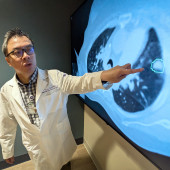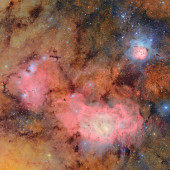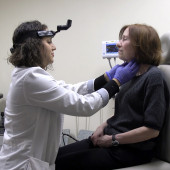Latest Releases
Find our latest releases below. After searching, you can view the most recent releases by clearing the search.
Browse experts on:

Experts available on provisions in Trump’s big budget bill
July 1, 2025
Senate Republicans, with a tie-breaking vote by Vice President Vance have passed President Trump’s ambitious budget bill, in an attempt to deliver it to his desk by the July 4 holiday. Sticking points include significant cuts to Medicaid and the SNAP food assistance program, as well as an estimated $3 trillion increase in the national debt.
* Media Advisory
* Media Advisory

Giant Magellan Telescope enters final design phase
June 30, 2025
The Giant Magellan Telescope (GMT), an enormous ground-based telescope currently under construction in Chile’s Atacama Desert, is one vital step closer toward completion.

AI matches doctors in mapping lung tumors for radiation therapy
June 30, 2025
In radiation therapy, precision can save lives. Oncologists must carefully map the size and location of a tumor before delivering high-dose radiation to destroy cancer cells while sparing healthy tissue. But this process, called tumor segmentation, is still done manually, takes time, varies between doctors — and can lead to critical tumor areas being overlooked.
Northwestern experts on SCOTUS upholding Obamacare’s preventive care provision
June 27, 2025
The U.S. Supreme Court preserved a key part of the Affordable Care Act (ACA) today, upholding coverage of preventive care.
* Media Advisory
* Media Advisory

Northwestern scientists launch projects using the Vera C. Rubin Observatory
June 24, 2025
Several Northwestern University scientists have played integral roles in Legacy Survey of Space and Time since 2014, contributing scientific leadership and innovation that helped shape the endeavor.

Wirtz Center’s 2025-26 season embraces individual courage
June 24, 2025
The 2025-26 season at the Virginia Wadsworth Wirtz Center for the Performing Arts at Northwestern University’s Evanston Campus explores themes of resilience and resistance.

Dance Marathon 2026 will benefit Bear Necessities
June 18, 2025
Northwestern University Dance Marathon (NUDM) has announced Bear Necessities Pediatric Cancer Foundation as its 2026 primary benefactor. The Chicago-based non-profit supports children battling cancer and their families with holistic, family-centered services that address the emotional, financial, psychosocial and educational challenges of a pediatric cancer diagnosis.
Northwestern law expert on U.S. Supreme Court allowing ban on gender-affirming care for minors
June 18, 2025
The Supreme Court upheld Tennessee’s ban on gender-affirming care for minor today in a 6-3 decision. “This is a major setback to trans rights and to equal protection doctrine,” says Kara Ingelhart, director of the LGBTQI+ Rights Clinic and clinical assistant professor of law at Northwestern Pritzker School of Law.
* Media Advisory
* Media Advisory

Three leaders in nanotechnology receive 2025 Kabiller awards
June 17, 2025
Nicholas Peppas, a professor at the University of Texas at Austin, will receive the $250,000 Kabiller Prize in Nanoscience and Nanomedicine, the world’s largest monetary award in the field.

Survivor says doctor saved her life. Together they’re marking National Cancer Survivor Month
June 17, 2025
Throat cancer survivor Paula Ruska credits Dr. Laila Gharzai, the radiation oncologist she says saved her life, for providing the holistic care that helped her heal. Gharzai credits Ruska for inspiring her latest study, which aims to improve follow-up care for other survivors.
* Media Advisory
* Media Advisory